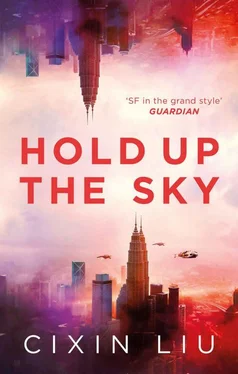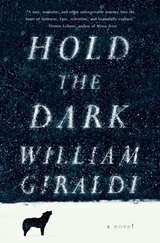Лю Цысинь - Hold Up the Sky
Здесь есть возможность читать онлайн «Лю Цысинь - Hold Up the Sky» весь текст электронной книги совершенно бесплатно (целиком полную версию без сокращений). В некоторых случаях можно слушать аудио, скачать через торрент в формате fb2 и присутствует краткое содержание. Город: London, Год выпуска: 2020, ISBN: 2020, Издательство: Head of Zeus, Жанр: Фантастика и фэнтези, на английском языке. Описание произведения, (предисловие) а так же отзывы посетителей доступны на портале библиотеки ЛибКат.
- Название:Hold Up the Sky
- Автор:
- Издательство:Head of Zeus
- Жанр:
- Год:2020
- Город:London
- ISBN:978-1-83893-763-8
- Рейтинг книги:4 / 5. Голосов: 1
-
Избранное:Добавить в избранное
- Отзывы:
-
Ваша оценка:
- 80
- 1
- 2
- 3
- 4
- 5
Hold Up the Sky: краткое содержание, описание и аннотация
Предлагаем к чтению аннотацию, описание, краткое содержание или предисловие (зависит от того, что написал сам автор книги «Hold Up the Sky»). Если вы не нашли необходимую информацию о книге — напишите в комментариях, мы постараемся отыскать её.
Hold Up the Sky — читать онлайн бесплатно полную книгу (весь текст) целиком
Ниже представлен текст книги, разбитый по страницам. Система сохранения места последней прочитанной страницы, позволяет с удобством читать онлайн бесплатно книгу «Hold Up the Sky», без необходимости каждый раз заново искать на чём Вы остановились. Поставьте закладку, и сможете в любой момент перейти на страницу, на которой закончили чтение.
Интервал:
Закладка:
She heard two new shrills. The artillery crew to her front and left fired its last two anti-tank missiles. The wire-guided Sagger missile successfully destroyed an Abrams; the other, radio-guided missile found its signal jammed and veered upward at an angle, missing its target. Meanwhile the six missile crewmen retreated from their bunker, running toward Kalina’s bomb crater as a Comanche helicopter dove for them, its angular chassis resembling the profile of a savage alligator. Machine-gun bullets struck the ground in a long row, their impact abruptly standing snow and dirt up in a fence that just as quickly toppled. The fence crossed through the little squadron, felling four of them. Only a first lieutenant and a private made it over to the crater. There Kalina noticed that the lieutenant was wearing an antishock tank helmet, perhaps taken from a destroyed tank. The two of them held an RPG each.
The lieutenant jumped into the crater. He took a shot at the nearest enemy tank, hitting the M1A2 head-on, triggering its reactive armor, the sound of the rocket explosion and the armor explosion mingling peculiarly. The tank charged out of the cloud of smoke, scraps of reactive armor dangling from its front like a tattered shirt. The young private was still aiming, his RPG jittering with the tank’s rise and fall, too uncertain to fire. Then the tank was just fifty, forty meters away, heading into a dip in the ground, and the private could only stand on the rim of the crater to aim downward.
His RPG and the Abrams’s 120 mm gun sounded simultaneously.
The tank gunner had fired a nonexplosive depleted-uranium armor-piercing round in his desperation. With an initial velocity of eight hundred meters per second, it turned the soldier’s upper body into a spray of gore upon impact. Kalina felt scraps of blood and meat strike her steel helmet, pitter-pattering. She opened her eyes. Just in front of her, at the edge of the crater, the private’s legs were two black tree stumps, soundlessly rolling their way to the bottom of the crater next to her feet. The shattered remains of the rest of his body had spattered a radial pattern of red speckles in the snow.
The rocket had struck the Abrams, the focused jet of the explosion cutting through its armor. Thick smoke billowed from the chassis. But the steel monster was still charging toward them, trailing smoke. It was within twenty meters of them before an explosion from within stopped it in its tracks, hurling the top of its turret sky-high.
The NATO tank line went past them immediately after, the ground trembling under the heavy impact of treads, but these tanks took no interest in their bomb crater. Once the first wave of tanks was past, the lieutenant grabbed Kalina’s hand and leapt from the crater, pulling her after him to the side of an already bullet-scarred jeep. Two hundred meters away, the second wave of armored assault was bearing down on them.
“Lie down and play dead!” the lieutenant said. So Kalina lay by the jeep’s wheel and closed her eyes. “It looks more realistic with your eyes open!” the lieutenant added, and smeared a handful of somebody’s blood on her face. He lay down, too, forming a right angle with Kalina, his head pressing against hers. His helmet had rolled to one side, and his coarse hair pricked at Kalina’s temple. She opened her eyes wide, looking at the sky almost swallowed by smoke.
Two or three minutes later, a half-track Bradley infantry fighting vehicle stopped ten or so meters from them. A few American soldiers in blue-and-white snowy terrain camouflage jumped from the convoy. The bulk of them leveled their guns and advanced in a skirmish line. Only one walked toward the jeep. Kalina saw two snow-speckled paratrooper boots step next to her face; she could clearly make out the insignia of the Eighty-second Airborne Division on the handle of the knife sheathed in his boot. The American crouched down to look at her. Their gazes met, and Kalina tried as hard as she could to make hers blank and lifeless across from that pair of startled blue eyes.
“ Oh, god! ” Kalina heard him exclaim. She didn’t know if it was for the beauty of this woman with a major’s star on her shoulder, or for the terrible sight of her bloody, dirty face; maybe it was both. He reached a hand to unfasten her collar. Goose bumps rose all over Kalina, and she nudged her hand a few centimeters closer to the pistol in her belt, but the American only tugged the dog tag from her neck.
They had to wait longer than expected. Enemy tanks and armored convoys thundered endlessly past them. Kalina could feel her body freezing almost solid on the snowy ground. It made her think of a couplet from an old army song, of all things. She’d read the words in an old book on Matrosov: “A soldier lies on the snowy ground / like they lie on white swan down.” The day she received her Ph.D., she’d written the lines in her diary. That had been a snowy night, too. She’d stood in front of the window on the top floor of Moscow State University’s Main Building; that night, the snow really did look like swan down, and through the haze of snow flickered the lights from the thousands of homes of the capital. She’d joined the army the next day.
A jeep stopped not far from them, three NATO officers smoking and conversing inside. But the area around Kalina and the lieutenant was clearing. The two finally rose. They jumped in their own jeep, the lieutenant turned the ignition, and they hurtled along the route planned out earlier. Submachine guns sounded behind them; bullets flew overhead, one shattering a rearview mirror. The jeep whipped into a turn, entering a burning residential area. The enemy hadn’t pursued.
“Major, you have a doctorate, right?” the lieutenant said as he drove.
“Where do you know me from?”
“I’ve seen you with Marshal Levchenko’s son.”
After a silence, the lieutenant said, “Right now, his son is farther from the war than anyone else in the world.”
“What are you implying? You know that—”
“Nothing, I was just saying,” the lieutenant said neutrally. Neither of them had their mind on the conversation. They were still lingering on that last thread of hope.
Of the entire battlefront, this might be the only breach.
Misha was experiencing the solitude of a lone inhabitant in an empty city.
The Vechnyy Buran really was the size of a small city. The modular space station had a volume equivalent to two supercarriers and could sustain five thousand residents in space at a time. When the complex was under centripetal force simulating gravity, it even contained a pool and a small flowing river. Compared to other space work environments of the day, it smacked of unparalleled extravagance. But in reality, the Vechnyy Buran was the product of the thrifty reasoning the Russian space program had demonstrated since Mir. The thinking behind its design went that, although combining all the functionality needed to explore the entire solar system into one structure might require a huge initial investment, it would prove absolutely economical in the long run. Western media jokingly called Vechnyy Buran the Swiss Army knife of space: It could serve as a space station orbiting at any height from Earth; it could relocate easily to moon orbit, or make exploratory flights to the other planets. Vechnyy Buran had already flown to Venus and Mars and probed the asteroid belt. With its huge capacity, it was like shipping an entire research center into space. In the field of space research, it had an advantage over the legion but dainty Western spaceships.
The war had broken out just as Vechnyy Buran was preparing for the three-year expedition to Jupiter. At that time, its over one hundred crew members, most of them air force officers, had left for Earth, leaving only Misha. The Vechnyy Buran had revealed a flaw: Militarily, it presented too big a target while possessing no defensive abilities. Failing to foresee the progressive militarization of space had been a mistake on the part of the designer.
Читать дальшеИнтервал:
Закладка:
Похожие книги на «Hold Up the Sky»
Представляем Вашему вниманию похожие книги на «Hold Up the Sky» списком для выбора. Мы отобрали схожую по названию и смыслу литературу в надежде предоставить читателям больше вариантов отыскать новые, интересные, ещё непрочитанные произведения.
Обсуждение, отзывы о книге «Hold Up the Sky» и просто собственные мнения читателей. Оставьте ваши комментарии, напишите, что Вы думаете о произведении, его смысле или главных героях. Укажите что конкретно понравилось, а что нет, и почему Вы так считаете.











